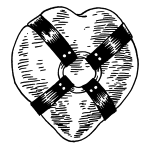1.
Lissette told me she was never very sexual with her husband. “In fact when we were first together we only had sex maybe twice a day.”
I’ll let the absurdity of the statement stand for itself. You just have to remember how fragile she is. I have to always remember it, and how fragile I am. We met in a café in Berkeley fifteen months ago, when she was still married. She was reading a fantasy book and I wasn’t reading anything. We loved each other with one foot out the door. Or we loved passionately, recklessly. We loved like we didn’t care if we lived or died or what the world looked like a week from tomorrow. And then we woke up bored, looked around for who else might be in the room. And she whispered softly in my ear, “We’re doomed. It will never work.”
2.
This is not an essay about breaking up with my girlfriend. I was leaning against a closed restaurant when I started to write this. Lissette wasn’t even home yet; she was still out in the desert celebrating the Burning Man festival. I was reading a book about Theo van Gogh, the filmmaker killed by an Islamic fundamentalist in Amsterdam. I had quit taking speed for the most part but only because it didn’t work anymore. I couldn’t focus and I was running out of money and I kept making plans and then giving up. I checked out war zones and interviewed celebrities and politicians but none of it mattered.
This is right now I’m talking about.
Around this time I was in New York and I got in bed with a twenty-three-year-old volunteer with long, thick red hair. I thought she was Russian but she said she was Spanish. She was just very pale. I couldn’t figure out what to do with her breasts. We were in bed half-naked and it was like this dead end. It was 2006, two months before the midterms. I could have gone for the belt on her jeans but I had no intention of doing that. I had wanted her but I had no idea what I wanted from her. I kept asking myself what all of it meant but you can’t ask yourself a question like that and expect any kind of answer.
Around this time I saw a woman walking down Valencia Street in San Francisco wearing a purple nightdress. She was limping, holding the hand of some punk rocker, staggering past the coffee shop. She was almost glamorous except I was in the Mission and in the Mission nobody is glamorous except the kids in the street gangs with their smooth...
You have reached your article limit
Sign up for a digital subscription and continue reading all new issues, plus our entire archives, for just $1.50/month.
Already a subscriber? Sign in





